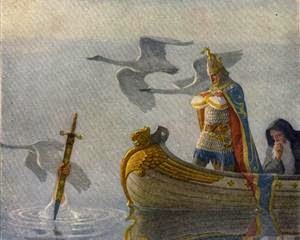Books 1 to 5 are now read and I’m on track, but only because I’d started this book ages ago and had already read to Book 4. I may fall behind but I’ll do my best not to.
 |
| Merlin Taking Away The Infant Arthur N.C. Wyeth source Wikiart |
I may have said before in some of my comments that this book was not what I expected. And what did I expect? Well probably something more similar to Sir Gawain and the Green Knight, where there is a quest, but an element of seriousness to it. Arthur’s knights seem to meander around looking for a quest, often stumble onto some odd happenings, hack and stab and kill some other knights or perhaps spare their lives. I’m not sure what has unsettled me about this read. Is it because Malory tells and tells and tells, but never shows? Is it the very ignoble behaviour mixed in with the gracious knightly behaviour? Is it because the story is related in a very serious tone but somehow it metamorphizes into something that is somewhat comical? I’m not really sure yet.
In any case, the story begins with Uther Pendragon coveting the Duke of Cornwall’s wife, Igraine. Pendragon makes a bargain with Merlin that if he will give him Igraine, he, in turn, will give over their first born child to Merlin. Of course, that child is Arthur, the one who pulls the sword from the stone and becomes King of all Britain, and also creates the order of The Kings of the Round Table.
 |
| ” … and when they came to the sword that the hand held, King Arthur took it up …” N.C. Wyeth 1922 source Wikiart |
What follows is the various adventures of his knights, with Arthur making appearances here and there. Other knights, especially wicked, dark knights, grumpy knights and average day-to-day knights, play prominent roles in the tales, where Arthur’s knights usually kill, maim or become friends with their opponents. Various ladies make appearances as well.
 |
| The Beautiful Lady Without Pity Arthur Hughes 1863 source Wikiart |
It was rather disturbing when Sir Gawaine managed to behead a lady while she was trying to protect her knight, but perhaps more shocking was Arthur’s slaughter of the innocent children born on May Day because of a prophecy that one born on that day would be the cause of his death.
Encouragingly, the plot began to pick up in Book 5. Emperor Lucius of Rome has come to demand tribute from Arthur. After a long and bloody battle, Arthur is victorious. As he prepares to send the bodies of Lucius and many of his senators back to Rome, his words to them sent shivers down my spine:
And I suppose the Romans shall be ware how they shall demand any tribute of me. And I commend you to say when ye shall come to Rome to the Potestate, and all the Council and Senate, that I send to them these dead bodies for the tribute that they have demanded. And if they be not content with these, I shall pay more at my coming, for other tribute owe I none, nor none other will I pay. And me thinketh this sufficeth for Britain, Ireland, and all Almaine, with Germany. And furthermore I charge you to say to them that I command them upon pain of their heads never to demand tribute of me ne of my lands.
Just thrilling!



It's always interesting to learn how dark some of these original tales were. I haven't read any books about Arthur yet, but it sounds like the Victorians must have given us that "purely noble" perception of him that comes to mind. Looking forward to reading your future updates!
Isn't it weird how knightly honor seems to demand hacking at whoever comes along, despite the fact that half the time they don't know who the other person is? Oops, that was my best friend! Sorry bro!
I'm not sure that it was just the Victorians. Sir Gawain and the Green Knight has a very different tone to it …… it's all about nobility, self-control, honour, etc. I haven't read enough to make an informed comment, but I have Parzival and de Troyes' Arthurian Romances still to read and I'm very interested now to see if the knight are portrayed as chivalrous or simply as a bunch of rag-tag knights out looking for a fight. I'll let you know!
LOL! I know! Occasionally their hostilities are begun in defence of a lady but mostly it's just war-mongering. Curious!
I am up to my ears in Roman Emperors at the moment. (P. Veyne L' empire gréco-romaine) This Emperor Lucius is ' fictive' I hope. The book was written in 15th C? In which year does La Morte d' Arthur take place?
I think Le Morte was written in the 14th century but my guess it that Malory might have been borrowing stories from others. Perhaps the story about Lucius was one of them. I don't think this Lucius was an emperor but wasn't there one who was …… or co-emperor or something like that? I have to drag out my Book of the Romans again. It's been too long since I read it.
Enjoy your time with the Roman emperors. Make sure they leave their daggers at the door!
Oh no, you're right. The 15th century. What do I know? 😉
Thanks for the detailed review. I'm going to read this book early next year, for my Lit. Movement Challenge. Your review encouraged me to start it. 🙂
It's really a fun book, but be sure to leave yourself lots of time. We thought we did, scheduling it over 2 months-ish, but it's still taking alot of reading time to get it completed. It seems to take much longer than other 1000 pages books ….. I'm not sure why …??? I'll be anticipating your review!